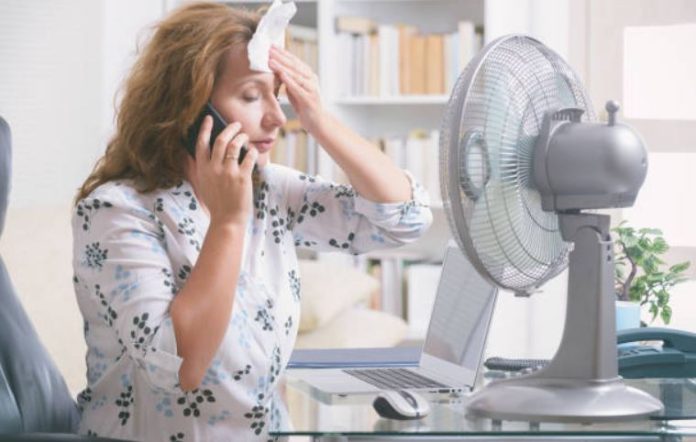They’ve been called power surges, raging hormones, or just good old-fashioned hot flashes.
Whatever you call them, if you’re a woman around the age of 50, you know they’re uncomfortable and sometimes even embarrassing.
That sudden onset of heat and perspiration seems to radiate from your body at the most inconvenient and unexpected times.
Doctors estimate at least 85% of women in the United States experience hot flashes during menopause.
Symptoms may vary in intensity but generally include:
-Intense heat coming
from your upper body and face
-Profuse perspiration
-Blotchy red face, neck, and upper chest
-Increased heartbeat
-A cold sensation as the hot flash stops
You’re probably aware that for women, the amount of estrogen being produced by your body decreases as you age.
Scientists theorize that this decrease in estrogen signals the temperature-regulating part of your brain that your body is too hot.
As a result, your brain sets a whole chain of events into motion by sending urgent messages to various places in your body.
Your heart is told to pump faster, the blood vessels in your skin told to enlarge and release the heat, and your sweat glands are told to turn on the sweat to cool you down and turn down the temperature. The immediate message is: cool it down.
But there is a light at the furnace door: hot flashes don’t last forever. They will reduce in frequency and intensity over time and eventually stop altogether.
It’s helpful to be aware of some common triggers that will set off a hot flash and turn on a blazing super soaker.
Caffeine, chocolate, alcohol, and smoking are common hot flash igniters. Other culprits include spicy foods and hot weather.
In addition to avoiding some of these common triggers, here are several simple and natural ways to relieve the symptoms of hot flashes.
1. Fire Prevention.
Start with turning your thermostat down. If family members or co-workers complain, try wearing lighter weight clothing made of 100% cotton. Cotton allows your body to breathe, letting the heat out and cooling you down faster.
Also keep some ice water nearby. If you start to feel that prickly sensation of a hot flash crawling up your face, take a drink of cool water. Its also not a bad idea to keep a fan nearby, either.
2. Keep Your Cool.
Research conducted on the brain indicates that stress is a major contributor to hot flashes. According to one recent study, stress causes the brain to release a chemical that stimulates the part of the brain regulating your temperature.
Health practitioners recommend daily stress reduction exercises such as meditation, yoga, massage, and breathing exercises.
As a matter of fact, according to Sadja Greenwood, M.D., assistant clinical professor of gynecology at the University of California at San Francisco Medical Center, women who practice deep, slow, controlled breathing have fewer and less severe hot flashes than those who don’t.
3. Beat the Heat.
Daily aerobic exercise will keep you ahead of your hot flashes — as well as keeping you healthy and fit. Regular 30-minute workouts release endorphins; hormones which tend to diminish in women as estrogen decreases.
Dr. Timothy Yeko, an assistant professor in the Department of Obstetrics and Gynecology at the University of South Florida suggests that an increase in endorphins helps to reduce the frequency of hot flashes and elevate good feelings.
Just be careful not to exercise right before bed, because it could bring on a case of night sweats.
4. Extinguish the Burn with Foods and Supplements.
Taking away some of the diet triggers such as caffeine, chocolate, and alcohol and adding soothing foods, vitamins, and herbs to your diet could help tame 3-alarm hot flashes.
Research has shown that eating foods made from soy products, such as soymilk, whole soybeans, tofu, and miso have reduced hot flashes and other menopausal symptoms greatly. Soy and other plants types contain isoflavones, an estrogen-like compound.
Adding Vitamin E has also been shown to help reduce hot flash frequency and severity. It can be found in wheat germ, wheat germ oil, safflower oil, whole-grain breads and cereals, peanuts, walnuts, filberts and almonds.
5. Ancient Heat Management Treatments.
Herbs have been used for thousands of years to help treat a multitude of symptoms. Those recommended by many traditional as well as alternative health care practitioners for menopausal symptoms include dong quoi, ginseng, evening primrose oil, licorice root, black cohosh, sarsaparilla, spearmint, damiana, motherwort, chasteberry, red raspberry leaves, wild yams, fennel, and anise.
Susan Lark, M.D., medical director of the PMS and Menopause Self-Help Center in Los Altos, California believes these special women’s herbs have a weak regulating effect on estrogen and may help control hot flashes.
For most women hot flashes, power surges, or raging hormones are simply a crazy part of the aging process and part of being a woman.
There’s no doubt they are an annoying and frustrating part. But, 10-15% of women have menopause symptoms severe enough to seek medical attention.
By all means, consult your doctor if necessary. In fact, all women should consult their healthcare practitioner before making any drastic lifestyle changes.
With a little action on your part, a natural approach to taming your hot flashes may be all you’ll need to get through them.

